Former RSU presidents weigh in on what it would take for the union to regain trust with its students.
Words by Alexandra Holyk
Visuals by Laila Amer
When Alexandra Nash started her undergraduate degree in psychology at Ryerson in 2017, she was sure of one thing: she didn’t want to get involved in student politics. Her lack of interest didn’t have to do with the Ryerson Students’ Union (RSU) itself but was more specific to the culture around student politics. Nash heard from her friends in course unions that the environment was often stressful and polarizing. She saw it as a “glorified student council”—a popularity contest where elected students don’t really accomplish anything.
Nash also noticed a much stronger student activist culture in other parts of the world, including Quebec. Based on this, she believed student unions should use their collective bargaining power to advocate for their membership, rather than focus on student life events.

Nash hoped to make substantial change by running to be a member of parliament for the New Democratic Party (NDP) in fall 2019. She ended up losing but realized during her campaign going door-to-door and speaking with constituents that it was still possible to leave a lasting positive impact in her community, which motivated her to give student politics a chance.
Once she returned for the winter semester, she was approached by the Inspire slate, one of two parties running in the 2020 RSU election. She was asked to join the team during the campaigning process, just weeks ahead of the vote.
Nash hesitantly agreed to join, initially afraid of burning out after the federal election and without much knowledge about the RSU’s internal operations. She figured that as a member of the organization, she’d have a seat at the table—a chance to voice her ideas around changing the image of the RSU.
In February 2020, the Rise slate won the majority of the seats on the RSU’s Board of Directors (BoD), including a full sweep of the executive positions. Some Inspire team members, including Nash, were elected as directors from several of Ryerson’s student faculties. Nash doesn’t explicitly advocate for the Faculty of Arts; instead, all board members collectively work in the best interests of the RSU and its membership.
Since joining the BoD, Nash has already experienced the polarizing landscape of student politics her friends had warned her about. She believes the reason for this is that the students coming into the union’s roles are still in the process of developing their own beliefs and skills and may not have the experience of operating in a professional environment and dealing with conflict. She says that “some people are convinced they know everything.”
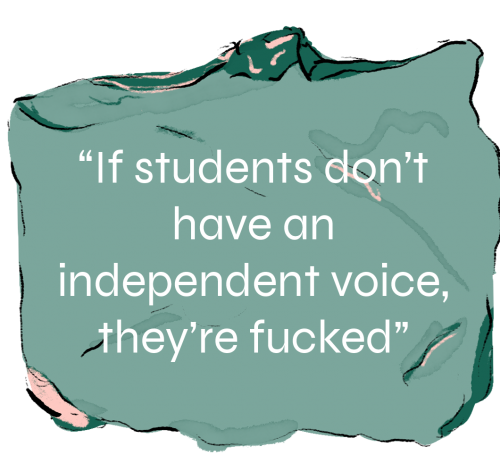
“I think in some ways, student politics is predisposed to be more divisive on the surface than non-student politics.”
She also feels that the turnover rate affects the environment; with new executives almost every year and having to start initiatives from scratch, tension is expected to rise. But despite it all, Nash is confident that the RSU has the potential to work in the students’ best interests.
“I do think that most, if not all, of the people that I’ve interacted with in student politics are driven to work for what they think is the right thing for students and for the RSU.”
The RSU is built on three pillars: student life, advocacy and services. In its mission statement, the union says it’s a “trusted” ally and “resource” for more than 40,000 full-time undergraduate and graduate students.
Since its inception dating back to the university’s founding in 1948, the intended purpose of the RSU has been to serve the Ryerson student body. In just the past decade, its most notable accomplishments include shutting down Gould Street, introducing gender-neutral bathrooms across campus and pushing for a fall reading week.
However, the union has also seen impeachments, resignations, terminations—of staff members, as well as its contract with the university—and hundreds of thousands of dollars from student levies spent by executives on personal expenses, all in just the last five years.
In a book about student government called Student Governance and Institutional Policy: Formation and Implementation, Michael Miller and Daniel Nadler define the role of a student government or union as being the voice of its membership. It should also encourage student participation in its decision-making process, as well as ethically collect and distribute student levies. Finally, the students’ union is tasked with addressing students’ needs by providing them with campus activities and services. Therefore, student governing bodies are necessary as they allow for institutional change based on the demands of their student populations, they argue.
Miller and Nadler go on to say that despite efforts to shape the quality of university life, however, student governments are often overshadowed by internal power struggles, student apathy and disorganization.
Miller says the feeling of power and self-importance is especially seen in the highest level of student government: the role of the president and their executive team. This can lead to a certain agenda being pushed by the team that may not be in favour of the student body and can affect the allocation of collected fees.
He added that corruption within a student government is not uncommon, and the RSU is no exception.
Ryerson students feel that there is a lack of transparency and trust with their representative governing body. Former RSU executives agree and believe that increased efforts in student awareness, among other aspects, can get the union back upon its pillars.
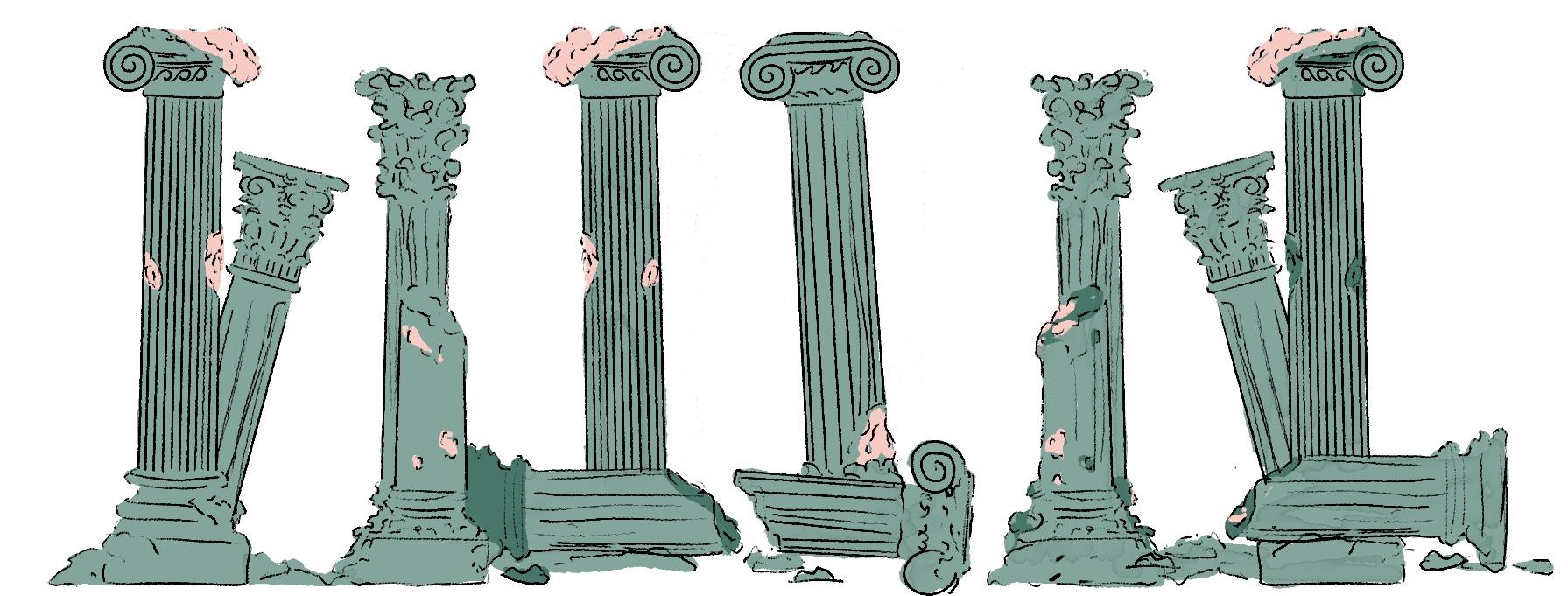
ora Loreto, a writer, activist and public administration graduate, remembers being excited to get involved in politics throughout her childhood before coming to Ryerson in 2003. Loreto recalls the carnival-like scene as she walked down Gould Street during the university’s fall Week of Welcome. As she strolled by booths, she was naturally drawn toward a booth organizing campaigns against tuition fees and encouraging students to vote in the provincial election. The booth was run by Alex Lisman, a former vice-president education of the student governing body, previously called the Ryerson Students’ Administrative Council (RyeSAC). Loreto spoke to Lisman about how she wanted to get involved and encourage students to think about tuition fees as they voted. Lisman put a star next to her name on the sign-up sheet, recognizing she was eager, and made sure to follow up with her.
Since she was of voting age, it was important to Loreto to vote to remove former premier Mike Harris from office, due to significant budget cuts his administration made to the Ontario education system—specifically, the cuts faced by her gifted program throughout her elementary school years. She was ready to get involved, but like many other first-year students, she wasn’t familiar with student politics.
In 2005, Loreto ran for vice-president of education and won, serving in the position for the next two years, after which she ran unopposed for president for the 2008-09 academic year. During her three years with the union, Loreto and her team changed its name to the RSU, illegally shut down Gould Street with student occupants—before the street was officially shut down by the City of Toronto in 2012—and claimed ownership of the Student Campus Centre (SCC). Loreto says many of these actions took years of planning, petitioning and negotiating with the university.
While organizers were mindful of student safety and took police response into consideration, Loreto says students involved in the campaigns weren’t worried about the legality of their actions because they felt they had strength in numbers.
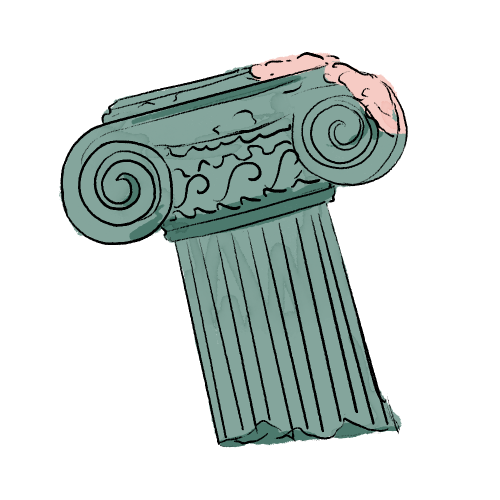
During those same years, however, Loreto faced internal power struggles when the teammates she ran in the elections with became her opposition.
“It was never over a political disagreement,” Loreto says. “It was, ‘We don’t like you, so we’re gonna take the power away from you as president.’”
Despite issues faced by the executives, Loreto says the union never had to prove why it needed to exist or felt as though it had a bad reputation. Though students knew about the union’s internal problems, they understood these as challenges that arose when members of a team had opposing views. Students continued to respect the union because the services they needed were still being provided, Loreto says. When there seemed to be an issue related to the union, the team would hold special general meetings to hear students’ concerns and would often meet or surpass quorum, which requires at least 100 full-time Ryerson students to be in attendance.
Since her term as RSU president, Loreto says that years of corruption have led students to believe there’s no point in having a students’ union, which is supposed to be their autonomous voice from the university.
Miller says corruption within a student government stems from two types of incoming student leaders: the student who wants to take something that’s undeserved—whether that’s money, power or the desire to appear influential—and the student who comes into the position not knowing what to do and not realizing that something they’re doing might be wrong.
“[Those types of leadership] become a problem, because we then create a culture of doing things that are not appropriate,” says Miller, adding that it sets a bad precedent for incoming executive members for years to come.
Loreto says she hasn’t been keeping up with the RSU recently but when something about the union pops up in her social media feeds, it’s usually negative. This de-legitimacy of the union is a disservice to students in that it removes the university’s opposition when it comes to matters of advocacy, she says. Today, this is seen in the RSU’s delay in lobbying the university for a pass/fail option for fall 2020 grades. Though the current vice-president education Siddanth Satish says he’s been in talks with Ryerson’s administration about re-introducing the credit/no-credit grading system, Ryerson president Mohamed Lachemi did not confirm to The Eye whether or not it would be an option. Meanwhile, final grades for fall 2020 were released on Jan. 12.
Loreto points out that the recent incidents she’s heard about have “only been a couple of years of shit,” and there’s a possibility to restore the organization’s relevance.
She proposes several ideas to help the RSU improve its reputation, which include showing what the union does through its work and services, removing executives and rebuilding the board if necessary and closing the knowledge gap for students who are unaware of the need for an autonomous student governing body.
“If students don’t have [an independent voice], they’re fucked.”

efore Susanne Nyaga took on the role of RSU president in 2017, she was heavily involved in student groups and collectives that advocated for marginalized folks on campus. Through conversations with vulnerable students, she realized that Ryerson wasn’t doing enough to provide the support and resources they needed. She also looked into the RSU’s history of advocating for students and compared it to what she saw at the time. Nyaga says it was sad to see such a powerful organization put students’ needs on the backburner.
She recalls the misuse of funding following 6 Fest in 2016 being another reason she ran for the position. The event, which Nyaga says was poorly organized, resulted in an approximate $1.1 million deficit, and Equity Service Centre (ESC) staff were left with minimal funds to organize events.
6 fest was an RSU-organized concert showcasing artists like Diplo, French Montana, Pusha T, Roy Wood$ and DVSN. The music festival was scheduled for September 2016, then moved to Thanksgiving weekend due to logistical complications. Many students demanded refunds for their tickets as they weren’t able to attend over the holiday weekend.
In January 2017, The Eye reported that almost $80,000 of 6 Fest refunds were transferred into the personal bank accounts of former vice-president student life and events Harman Singh, Ram Ganesh (who went on to become RSU president in 2018-19), Merch (Ganesh’s private merchandise business) and Ali Yousaf, at the time a director of the RSU finance committee and now RSU president.

“A lot of the decisions that I saw coming out of the RSU weren’t really reflecting the needs of students,” Nyaga says. “They were more reflecting the needs of the executives…and the power or clout that they wanted to obtain.”
In Miller and Nadler’s book, they point out that student advocacy is supposed to play a large role in the functionality of a student government. But for most student unions, they say the reality is that advocacy is almost completely absent—it’s limited to the executives and the governing body itself rather than the student body it’s supposed to be representing.
This year alone the RSU had to cut several student services during the COVID-19 pandemic. This includes the Good Food Centre (GFC) and the Centre for Safer Sex and Sexual Violence Support (C3SVS). Though Yousaf and the RSU’s vice-president equity Vaishali Vinayak say the C3SVS is still operating, its full-time and part-time staff were fired in November 2020 because “the centre was being managed poorly,” Yousaf said in a statement to The Eye. The GFC coordinator was also one of five full-time RSU staff members laid off due to a fear of low enrolment numbers and lack of work, according to Yousaf.
Once Nyaga was elected, she felt that the environment within the RSU’s executive team was toxic. Three out of the five executives were from the opposing slate with ties to the previous year’s executives, and everyone seemed to want different things. However, she was determined to achieve the best for the students and the union without conflict, even if it meant taking on every role of the executive team when other team members were being apathetic toward their responsibilities.
Miller and Nadler further point out in their book that student apathy is quite common when it comes to student government. It starts within the union itself; the student government is only as powerful as the determination and energy of the students involved.
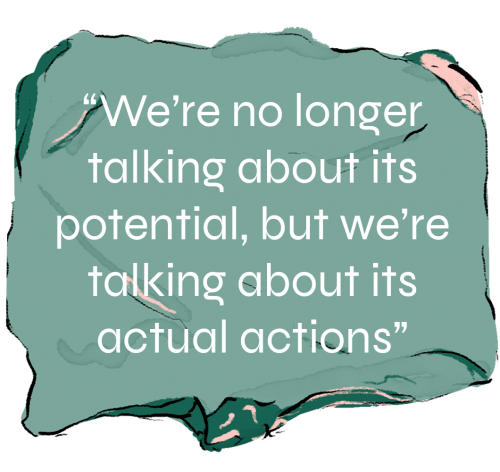
Nyaga understood that her fellow executives may have been inexperienced stepping into the role, but she says the main problem with the team not doing their jobs stemmed from erosion in communication—people weren’t reaching out for support in their projects, weren’t showing up for meetings and weren’t communicating about their absence.
One of the first controversies Nyaga faced during her term was “Colonialism 150,” a campaign launched on Facebook that criticized Canada 150 celebrations in July 2017 due to the country’s roots in colonialism. Several RSU executives and directors said they weren’t aware of the campaign ahead of the Facebook post, including Nyaga.
Nyaga says she and the then-vice-president equity received backlash from the RSU board, as well as people responding to the campaign online, and recalls dealing with a lot of similar issues throughout her term. “I felt like I was always being brought on to clean up messes, but never brought on to use [my] expertise to ensure that messes weren’t there to clean up.”
Nyaga knew the RSU had a bad reputation when she came into the role and believes the lack of transparency continues to exist between the union and its students. Since headlines surrounding the RSU tend to be negative, it’s difficult to build trust with the membership.
Miller says the RSU is at fault for not communicating transparently. Contact information such as emails and phone numbers are often buried on websites, making it difficult for students to express their concerns efficiently. “The union has a full unequivocal responsibility to inform their public of the good and bad things that are occurring within their organization and that they’re taking actions.”
According to RSU bylaws, the president acts as the spokesperson on behalf of the organization. In the past, there was open communication with the student body, as well as the media. Board meetings would be open for students to attend and voice their concerns. This year, however, BoD meetings aren’t announced to the student body in advance. One student who came to a meeting to voice their concerns was muted, and Yousaf only communicates with The Eye via emailed statements on behalf of the entire RSU board.
In early 2019, the year following Nyaga’s presidential term, The Eye obtained photos of financial statements showing food, clothing, alcohol and club purchases made with RSU credit cards under the names of executive members, including Ganesh—totalling to more than $250,000. The statements were discovered by the RSU’s student groups director at the time, Maklane deWever, who requested to see the union’s financial reports, which were supposed to be provided to the board but weren’t.
The student body was quickly made aware of what happened and called for Ganesh’s impeachment. After the first vote to impeach him failed, a second vote was conducted at the February 2019 BoD meeting and passed. Following this, deWever was elected as interim president in a secret ballot vote.
deWever believes the changes he made during his short time in office became the catalyst for students to get more involved and demand transparency. That being said, he points out that the union must meet students where they’re at rather than expect students to come to the union with questions and concerns.
“I remember at a town hall, it was called ‘Transparency and Trust’…it was supposed to be this opportunity for students to come talk to me and people at the RSU, and no one showed up,” recalls deWever.
Though deWever can’t speak to this year’s executive team, both he and Nyaga say that in order for the RSU to regain trust with its membership, it must connect with students in order to be more transparent.
“I hope that accountability and integrity can become foundational to the work that the RSU does,” Nyaga says. “We’re no longer talking about its potential, but we’re talking about its actual actions.”
“I think Ryerson students deserve a lot better than they’ve had recently.”

ooking back on her experience with the RSU over the past year, Nash says she doesn’t regret getting involved in student politics. But as the situation evolves, both with the pandemic and the board itself, she still isn’t sure what to expect.
Nash says that students are a disempowered group, and for that reason, they need an organization that fights for them. When it comes to the RSU, she understands that scandals tend to be more visible than helpful services the union offers, and she doesn’t blame students for not wanting to get involved in student politics. However, she does ask students not to lose sight of the power of collective action.
“My personal feelings around any kind of organization that you’re a part of that you want acting differently…is to be actively involved and to make your voice heard.”


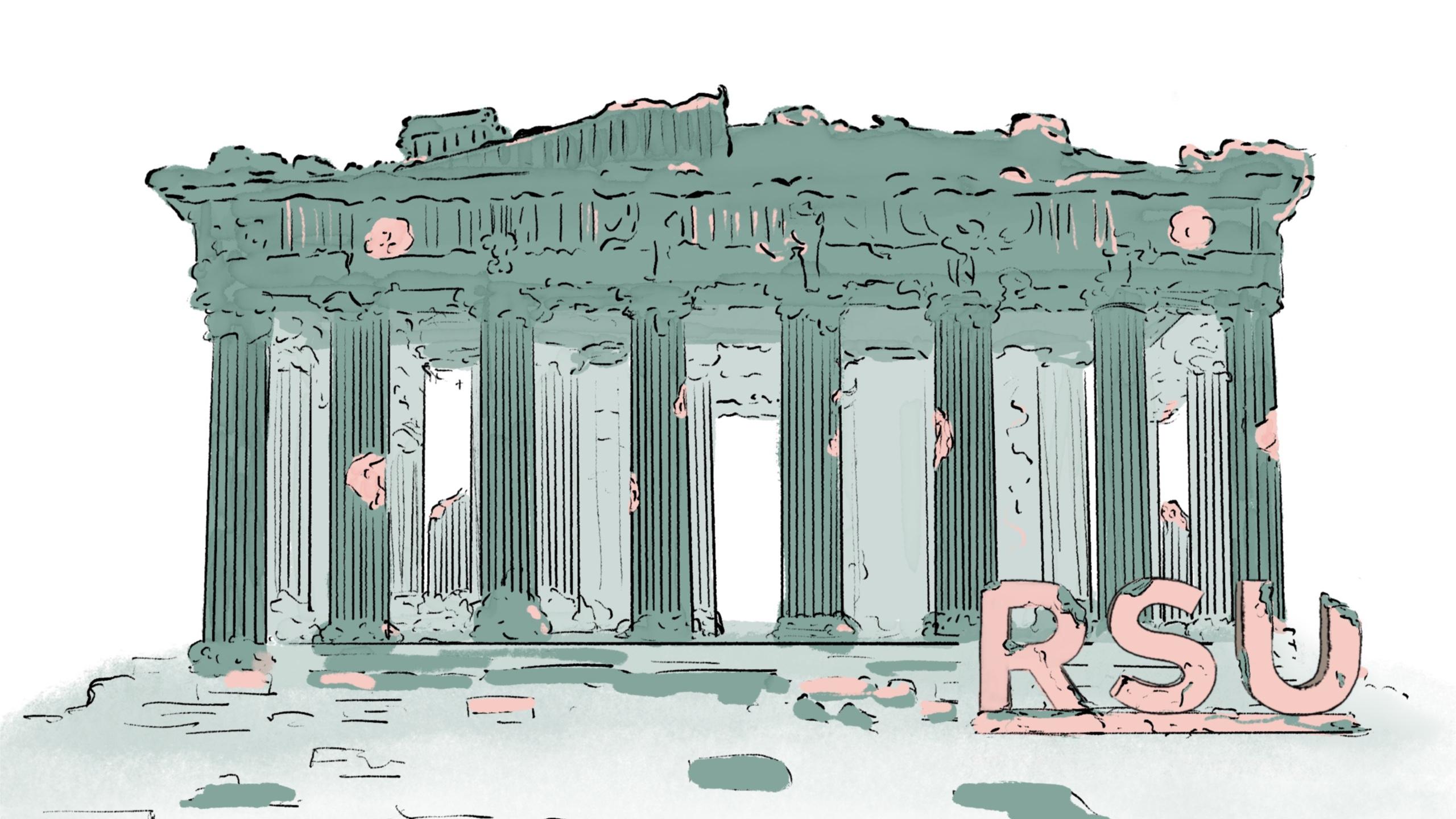










Leave a Reply